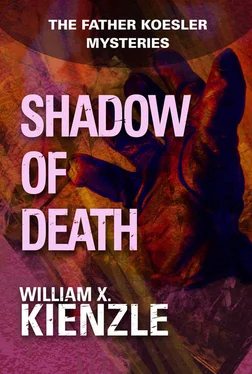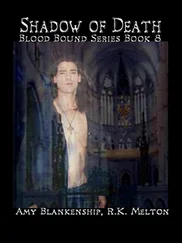The two chuckled, but not pleasantly.
The man pressed a button on the intercom. “Angela, show the good Father in.”
As Koesler came through the door, on which was affixed the sign, “Louis Licata, President,” the two large men were there to intercept him. One began to check the priest for weapons. As his sides were being patted down, Koesler winced noticeably, and let out a barely audible groan.
“Go easy,” Licata directed, “the good Father seems to have had an accident recently.”
The two laughed again, mirthlessly.
“Vacante,” announced the searcher.
“Very well,” said Licata. “Leave us.”
The two exited, leaving Licata and Koesler alone. Licata motioned Koesler to a comfortably upholstered chair in front of the desk. The priest gingerly eased himself into it.
“What brings you to me, Padre?” Licata leaned back and gazed at Koesler through the upper half of bifocals.
“I thought I’d better pay you a visit before you paid me another one.
“You are mistaken, Padre.” There was a hint of amused smile. “In my memory, we have never met before this day.”
“Perhaps not you personally, Don Louis. Perhaps it was your men, your friends ,” Koesler emphasized the word to indicate he understood its Mafia connotation, “or those you hired. But it was at your command we were visited.”
“‘We’?”
“My friends—Ramon Toussaint and Inspector Koznicki—and myself.”
“Interesting.” Licata’s fingers formed a steeple touching his lips. “I did not know a simple parish priest could have such an overactive imagination. Tell me, how did you arrive at this preposterous conclusion.”
His smile told Koesler that Licata was toying with him. Nevertheless, the priest persisted.
“I had no trouble believing the Rastafarian plot to kill papabili, bizarre as it was. But I began having doubts when the black fist symbol was found at each location where a Cardinal was attacked. The Rastafarians have no history or reputation of leaving a symbolic calling card.
“But we were dealing, quite obviously, with a group that must have almost worldwide capabilities of action. This was a plot, after all, that demanded the capability of striking against Princes of the Church in widely scattered areas of the world. Among those organizations that have that sort of capability is the Mafia. Wherever the Mafia is not present in force, they have sufficient contacts to issue . . . I believe it is called a contract. In addition, one of the early symbols used by the Mafia was the black hand.”
“Fascinating.” Licata’s smile had narrowed and frozen. “But very—how is it called in the courts?—circumstantial. The Mafia has no . . . uh . . . patent on any symbol. A black fist is the symbol of the Black Power movement. There is every reason to expect a group like the Rastafarians to adopt it. What are they if not believers in black power? Besides, what reason would the Mafia have to be involved in a plot against the Princes of the Church? Sicilians, after all,” he spread his arms wide, “are Catholics.”
“Precisely.” Koesler, so absorbed in his exposition that he had, in effect, self-hypnotized himself against his pain, leaned forward. “But what if, with your excellent contacts, you learned of the Rastafarian plot early on? Learned that one of their targets was a man—a Cardinal—from whose assassination you could spin off and, under the guise of an attack against him, be able to settle an old score.”
“An old score?” The smile had vanished.
“Yes, an old score. I may have had my doubts when it came to linking the clenched black hand with the Rastafarians, but I could have lived with those doubts. Then, attempts were made on Ramon and the Inspector . . . and my doubts grew. Up till then, only Cardinals had been attacked. Now a deacon? And a police officer? The only explanation was that they had been attacked because they were protecting the established target, Cardinal Boyle. Still, I thought it a pretty thin explanation.
“But once I was attacked, that explanation evaporated, I didn’t fit into this picture—unless the scenario was divided differently. What if I were to group Cardinals Claret, Gattari, and Boyle together as targets of the Rastafarians? Targets in whose attacks you participated by placing the symbolic black fist at the scene of the crime, so the police would think all the attacks were linked.
“But, suppose I group Toussaint, Koznicki, and myself in a separate bracket. What is it that could possibly link the three of us, I asked myself. Only the incident several years ago, when some of Detroit’s crime figures were murdered and their heads found on statues in Catholic churches. The first and most notorious of those victims was Rudy Ruggiero, the reputed Detroit Mafia leader.
“And, among those suspected of involvement in those killings was one Ramon Toussaint—although he was never charged with the crimes. Responsible for the homicide investigation, which concluded with the matter being placed in the unsolved cases file, was Walter Koznicki. Also involved—and perhaps the closest confidante of Toussaint—was myself.
“I put all this together and arrived at the successor of Mr. Ruggiero: the reputed present head of Detroit’s Mafia family, Don Louis Licata.
“Also, in the assaults against Toussaint and Koznicki, the calling card changed ever so slightly. From a black fist to an open black hand, the celebrated symbol of the Mafia. The Mafia had made its statement. As the Rastafarians attempted to carry out their clumsy plans, the Mafia, with characteristic cleverness, was there even in advance of the Rastas. And the Mafia, with characteristic bravado, supplied a calling card that could easily be associated with the Rastas and the Black Power movement. The Rastas would not even tumble to what was going on.
“Then, with the Rastas discouraged and ready to abandon their grand scheme, the Mafia proceeded on its original plan to settle that old score. And, along the line, the calling card is changed ever so subtly into the notorious black hand.”
Koesler looked at Licata expectantly. “Have I left anything out?”
“Nothing of any consequence.” The smile reappeared. “You have only one problem—but it is a big one: You have no proof. There are no witnesses except those who will protect me with the ornertà, their silence. Nothing you have said would stand up in court. That is your problem—and it is a formidable one.”
“That may be my problem, but it is not my question. My question is why? There was no trial. No one was even arrested in the death of Mr. Ruggiero. Why would you take it upon yourself to attempt to kill three people, none of whom was charged with any crime . . . all of whom must be presumed to be innocent of any crime.
“Why, Mr. Licata . . . why? I just don’t understand.”
Licata spread his hands flat on the desk top. “You do not understand because you do not understand us.
“We Sicilians are most concerned about reputation, about saving face. An insult or a killing must be avenged. We cannot live with it; it must be avenged. We have an expression: Liυarisi na petra di la scarpa . . to take a stone out of one’s shoe.
“With some who are united in ‘our cause,’ this revenge must be taken by ourselves. We care nothing for the authorities. The authorities care nothing for us. We are our police. We are our banks. We dispense justice. We have to—because nobody else ever gave a fig for us, nobody else cared about us, nobody else helped us or defended us—or even knew we were alive, except to look down on us.
“Now, especially when outsiders dare to strike at us, they must know that we will not be satisfied even if they are punished by the authorities with merely a few years in prison. No; they must—and they will—receive our justice . . . and our cause is avenged.
Читать дальше












